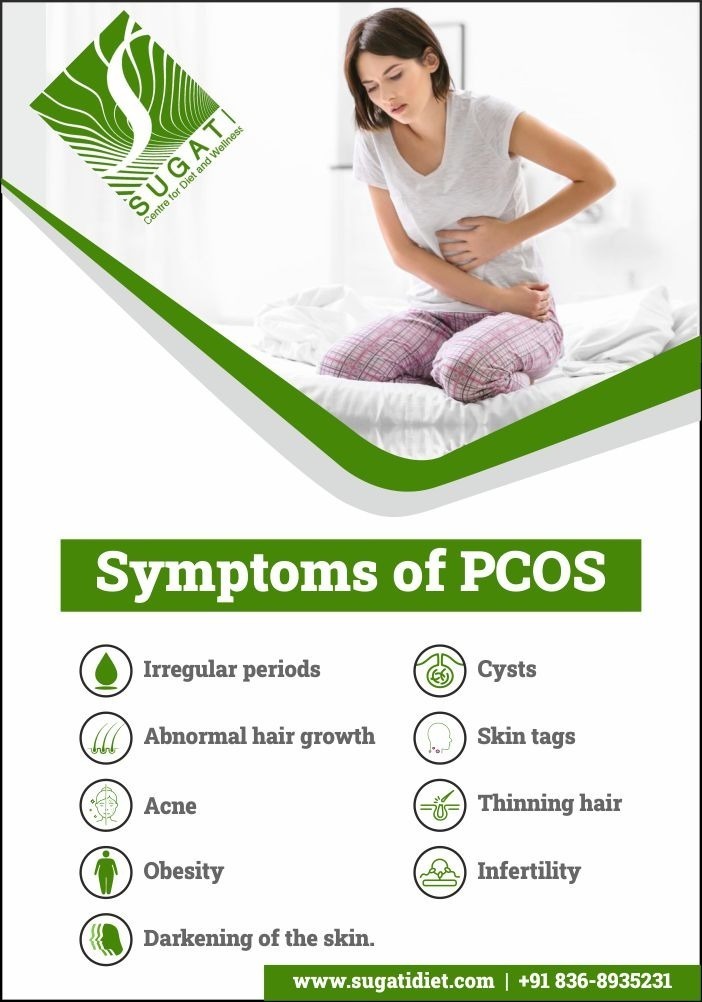
PCOS or Polycystic Ovarian Syndrome is a complex endocrinal disorder widely prevalent today. About 1 in 10 women suffer from this condition. PCOS is characterized by a combination of the following symptoms:
- Increased level of androgens or male hormones
- Cysts in the ovaries
- Menstrual irregularities thereby affect fertility
- Acne
- Excessive hair growth on the body
- Hyperpigmentation of the skin
- Increase in body weight
- Thinning of the hair
- A predisposition to Type 2 Diabetes owing to the insulin resistance
- An increased chance of developing cardiovascular disease
An important part of PCOS management is diet modification and lifestyle changes. As far as diet goes, the right diet goes a long way in managing the condition and keeps the symptoms at bay.

Table of Contents
Feel free to skip ahead if one topic catches your eye:
- How does diet affect PCOS
- Dietary guidelines in PCOS
- Ideal foods to include and those to avoid in PCOS
- Weekly Indian diet chart for PCOS
- FAQs
Takeaway
1. How does diet affect PCOS?
- Following the right diet helps with effective weight loss. Even a 10% loss in body weight improves PCOS symptoms and lowers the risk of other associated conditions.
- The production of insulin and insulin resistance is a critical factor in PCOS.
- Diet management done the right way combats insulin resistance and has a positive influence
- The diet you need will have to be curated based on your symptoms, your body weight, how your body metabolizes carbohydrates, etc.
2. Dietary guidelines in PCOS
- Keep an eye on portion size – Having control over your portion size ensures that your intake is what you need and not in excess.
- Include plenty of whole grains and high fiber foods- Fiber-rich foods manage the cholesterol in your body and help in fat mobilization by enhancing fat metabolism.
- Restrict the intake of unnatural sweeteners and white sugar. Choose natural sugars and their derivatives. Artificial sweeteners contain a lot of empty calories with no nutritional benefits.
- Limit added salt and stick to home-cooked food – Adding herbs and spices enhance flavour and your food can still be tasty.
- Choose your fats wisely – Include unsaturated fats and stay away from trans fats. Oils derived from nuts and seeds – Sesame, sunflower, peanut, safflower, coconut oil, etc., are your best bet.
- Strive for a healthy balance of all nutrients in your food. A general rule of thumb is to fill 50% of your plate with low-carb vegetables such as spinach, cauliflower, brinjal, bitter gourd, ridge gourd, etc., 25% of your plate must include lean protein in the form of poultry, fish, chickpeas, or lentils. The rest 25% should be a complex carbohydrate such as millets, brown rice, whole wheat dishes, etc.
3. Ideal foods to include and those to avoid in PCOS
| INCLUDE | AVOID |
| Apples, broccoli, plums, guava, green peas, sweet potato, etc. | White potato, Chikku, canned fruits, bananas, jackfruit, mango, etc. |
| Spinach, Amaranthus, Asparagus, Methi, etc. | Cakes, candy, pastries and white pasta |
| Strawberry, Raspberry, Purple grapes | Red meat |
| Lean meat – Chicken, fish, turkey, etc. | Processed meats |
| Brown rice, quinoa, whole wheat, bajra, jowar, moong, hand pound rice | White rice, Refined flour, Corn, etc . |
| Flax seeds, chia seeds, sunflower seeds | Chips, namkeen, pretzels, etc. |
| Mackerel, snapper, trout, sardines, pomfret, tilapia, etc. | Canned fish, salted fish pickle, etc. |
| Homemade vegetable or chicken soups | Soup cubes, canned soups, stock, etc. |
| Fresh herbs such as cinnamon, ginger, turmeric, etc. | Artificial sweeteners, added salt, caffeinated beverages, and packaged drinks |
4. Weekly Indian diet chart for PCOS
| Breakfast | Lunch | Snack | Dinner | |
| Monday | Ragi porridge of boiled egg | Brown Rice, dal, and cabbage fry | Fruit salad with apple, guava drizzled with honey | Homemade tandoori chicken curd lemonade |
| Tuesday | Dalia +Orange juice | Whole Wheat roti + fish curry | Veg smoothie | Jeera rice green peas masala and turkey meatballs |
| Wednesday | Brown riceIdlis+ Sambhar or coconut chutney | Brown rice & country chicken egg curry curd | Almonds + Buttermilk | Veg soup Sauteed spicy boiled eggs |
| Thursday | Vegetable poha + Chutney | Chapati Chicken stew | Whole wheat bread sandwich with peanut butter or honey | Grilled fish + carrot kosambari |
| Friday | Whole wheat pancakes + honey | Multigrain roti+ dal+ roasted chicken | Roasted nuts – chana, cashews | Thalipeeth + Curd |
| Saturday | Gobi paratha with butter and curd | Millet khichdi+ Rajma masala | Sprouts with a dash of lime | Green soup+ grilled paneer |
| Sunday | Scrambled eggs + apples or guava | Chicken biryani+raita | Whole oatmeal with fruits or curd | Roasted chicken and cauliflower with salad |
5. FAQ’s:
1. Name the hormones that are affected by PCOS?
- Follicle-stimulating hormone- FSH
- Luteinizing hormone- LH
- Male hormones such as testosterone and androstenedione
- Estrogen
- Progesterone
- Insulin
2. What are the common signs and symptoms of PCOS?
The common signs and symptoms of PCOS are
- Menstrual irregularities
- Ovarian cysts
- Trouble getting pregnant
- Weight gain
- Mood swings
- Fatigue
- Acne
- Diminished libido
- Male pattern baldness
- Hair thinning coupled with hair loss
- Excessive hair growth
- Trouble losing weight
3. What is insulin resistance?
Insulin is a hormone produced by the pancreatic cells and facilitates the body to use the glucose produced due to digestion. Every cell has insulin receptors to which insulin binds and creates a gateway for the glucose to enter the cells.
Under certain circumstances, the cells become resistant to insulin, and glucose uptake is compromised. This results in low energy levels and increased levels of blood sugar.
4. What is an ideal diet for a person having PCOS?
- The right diet for PCOS would be high fibre and devoid of simple carbohydrates.
- Emphasis is more on including whole, natural, unprocessed foods
- Refined sugars and processed foods are a strict no-no
- Limiting salt intake and avoiding excess sugar is a key concept of PCOS diet
- Having smaller meals provides the body with timely nutrition as well as avoids spikes in blood sugar
5. What causes PCOS?
The exact cause of PCOS has not been pointed to a single factor yet. A multifactorial influence has been found to trigger the development of the condition. These include
- Obesity,
- Insulin resistance,
- Underlying hormone imbalances,
- Genetics,
- Bad dietary choices,
- Unhealthy lifestyle,
- Weakened immune system.
6. Can PCOS affect your chances of pregnancy?
Egg maturation and ovulation or the release of an egg are important prerequisites for pregnancy. PCOS negatively influences both these processes, and getting pregnant with PCOS can be challenging.
7. Is there a cure for PCOS?
The symptoms of PCOS can be managed very well by combining the right diet, lifestyle modification, and medication. When these changes become part of your lifestyle, the symptoms can be kept at bay, and the chances of conception greatly improve.
8. If you have PCOS, what medical problems are you prone to having?
With PCOS, the chances of Type 2 Diabetes, heart disease, and other metabolic disorders increase. This is due to the impending insulin resistance and obesity.
9. How is PCOS diagnosed?
The diagnosis of PCOS is made by a gynaecologist by a combination of
- A detailed medical history,
- Physical examination,
- An ultrasound,
- Blood tests to determine the hormone levels.
10. Will losing weight for a woman with PCOS improve her chances of becoming pregnant?
Research has established that even a 5 to 10% reduction in body weight reinstates regular menstruation and ovulation and improves your chances of getting pregnant.
Recent Post
Crafted by Webcreatore Digital Solutions LLP.






